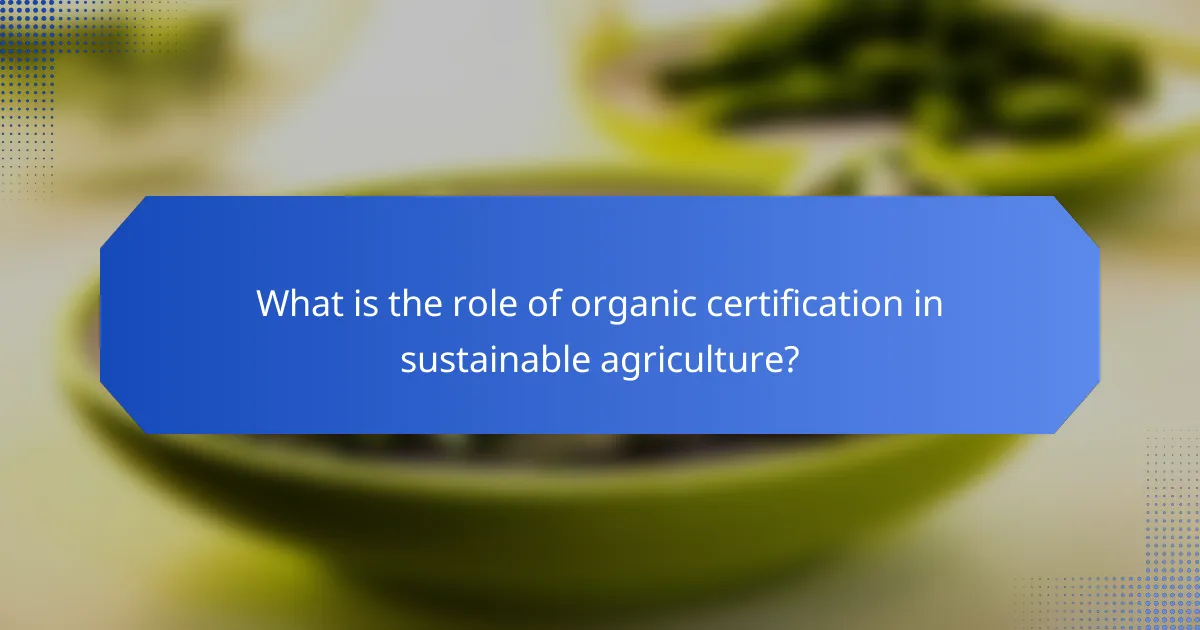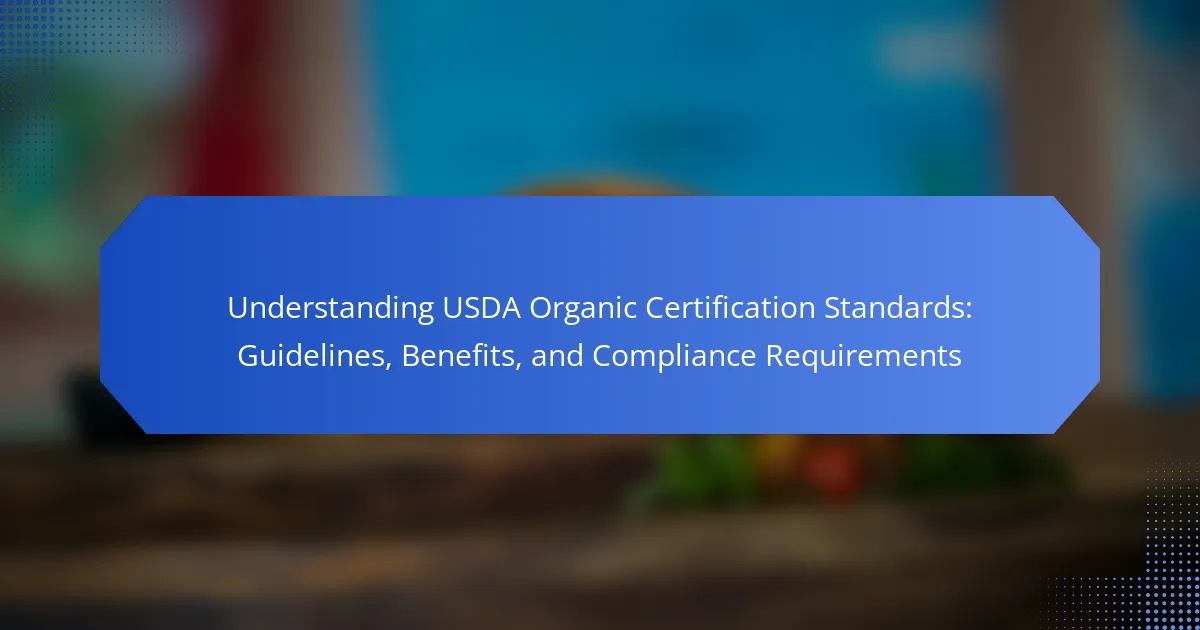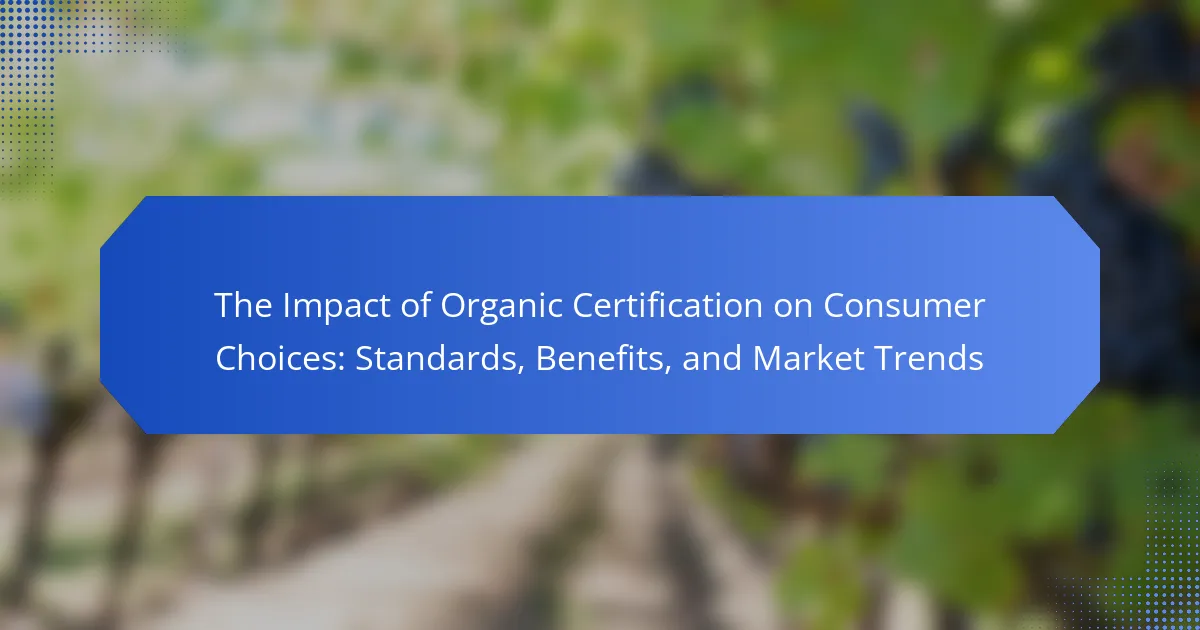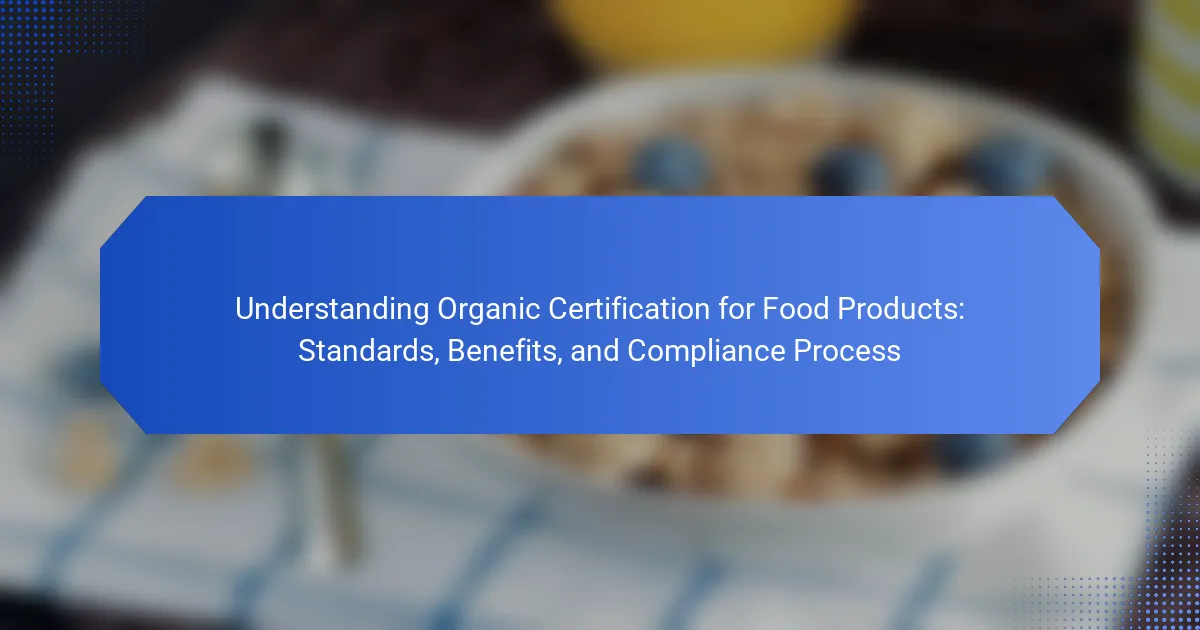Organic certification is a key aspect of sustainable agriculture, ensuring that farming practices adhere to specific environmental and health standards. It verifies that farmers utilize methods that enhance biodiversity, improve soil health, and minimize chemical inputs. The USDA’s National Organic Program (NOP) establishes regulations for organic farming in the United States, requiring the absence of synthetic fertilizers, pesticides, and GMOs. This certification not only assures consumers of product quality and safety but also promotes environmentally responsible farming practices that support higher biodiversity levels and humane treatment of livestock. The article will explore the standards governing organic certification, its benefits for consumers and the environment, and its overall impact on sustainable agriculture.

What is the role of organic certification in sustainable agriculture?
Organic certification plays a crucial role in sustainable agriculture by ensuring that farming practices meet specific environmental and health standards. This certification process verifies that farmers use methods that promote biodiversity, soil health, and reduce chemical inputs. It helps consumers identify products that align with their values regarding environmental sustainability. According to the USDA, organic farming practices can enhance soil fertility and ecosystem health. Additionally, studies show that organic farms can support higher levels of biodiversity compared to conventional farms. Thus, organic certification not only guides consumer choices but also fosters environmentally responsible farming practices.
How does organic certification contribute to sustainable practices?
Organic certification enhances sustainable practices by ensuring environmentally friendly farming methods. It mandates the use of natural inputs and prohibits synthetic pesticides and fertilizers. This reduces chemical runoff into water systems. Organic practices promote biodiversity by encouraging crop rotation and the use of cover crops. These methods improve soil health and reduce erosion. According to the USDA, organic farming can increase soil organic matter, which enhances carbon sequestration. Additionally, organic certification often requires animal welfare standards, contributing to ethical farming practices. This holistic approach supports ecological balance and long-term sustainability in agriculture.
What are the key principles of organic certification?
The key principles of organic certification include the prohibition of synthetic fertilizers and pesticides. Organic farming emphasizes the use of natural substances and processes. Soil health is prioritized through practices like crop rotation and composting. Biodiversity is encouraged by maintaining diverse ecosystems. Organic certification requires adherence to specific standards set by regulatory bodies. These standards ensure that products are grown and processed without harmful chemicals. Traceability from farm to consumer is also a crucial aspect. Compliance with these principles is verified through regular inspections and audits.
How does organic certification differ from conventional farming standards?
Organic certification requires adherence to specific practices that promote ecological balance. This includes avoiding synthetic pesticides and fertilizers. In contrast, conventional farming allows the use of these chemicals. Organic standards also mandate crop rotation and biodiversity to enhance soil health. Conventional methods often prioritize monoculture, which can degrade soil quality. Additionally, organic certification prohibits genetically modified organisms (GMOs), while conventional farming may incorporate them. The USDA oversees organic certification in the United States, ensuring compliance with established regulations. This regulatory framework supports consumer confidence in organic products.
Why is organic certification important for farmers?
Organic certification is important for farmers because it validates their agricultural practices and enhances marketability. Certified organic products often command higher prices compared to conventional ones. This price premium can significantly increase farmers’ income. Additionally, organic certification opens access to a growing consumer base that prefers organic products.
Farmers with organic certification can also benefit from government support programs. These programs may include grants, subsidies, or technical assistance aimed at promoting sustainable practices. The certification process ensures compliance with strict standards, which can improve soil health and biodiversity on farms.
Research indicates that organic farming can lead to better environmental outcomes, such as reduced pesticide use and improved water quality. According to the USDA, organic farming practices can enhance ecosystem services, benefiting both farmers and the environment.
What are the economic benefits of organic certification for farmers?
Organic certification provides farmers with higher market prices for their products. Certified organic products often sell at a premium compared to conventional ones. For instance, organic vegetables can fetch prices up to 50% higher. This price difference can significantly increase farmers’ revenue. Additionally, organic certification opens access to niche markets. These markets are often less competitive and can provide more stable income streams. Research shows that organic farms can be more resilient to market fluctuations. A study by the USDA found that organic farmers had better profit margins during economic downturns. Overall, organic certification enhances economic stability and profitability for farmers.
How does organic certification affect market access for farmers?
Organic certification significantly enhances market access for farmers. It allows farmers to sell their products at premium prices. Certified organic products are in high demand among consumers. This demand is driven by consumer preferences for healthier and environmentally friendly options. Research shows that organic products can achieve prices 20-50% higher than conventional ones. Certification opens doors to specialized markets, including health food stores and organic farmers’ markets. Additionally, many retailers require organic certification to stock products. This requirement further expands market opportunities for certified farmers. Overall, organic certification is a vital tool for improving farmers’ market access and profitability.
What are the environmental impacts of organic certification?
Organic certification has significant environmental impacts. It promotes biodiversity by encouraging diverse crop rotations and reduced monoculture practices. Organic farming methods also enhance soil health through the use of compost and cover crops. These practices improve soil structure and increase organic matter content.
Additionally, organic certification reduces chemical pesticide and fertilizer use. This leads to lower levels of agricultural runoff, protecting water quality in nearby ecosystems. Organic farms often implement sustainable practices that conserve water and energy, contributing to overall resource efficiency.
Research indicates that organic farming can lead to a 30% reduction in greenhouse gas emissions compared to conventional farming (Source: “Environmental Impact of Organic Farming,” by Smith et al.). Thus, organic certification supports environmental sustainability by fostering healthier ecosystems.
How does organic certification promote biodiversity?
Organic certification promotes biodiversity by encouraging farming practices that support diverse ecosystems. These practices include crop rotation, reduced pesticide use, and organic fertilizers. Such methods enhance soil health and create habitats for various species. Studies show that organic farms typically host higher levels of biodiversity compared to conventional farms. For instance, a meta-analysis by Bengtsson et al. (2005) found that organic farming systems support more species of plants, insects, and soil organisms. This increased biodiversity contributes to ecosystem resilience and stability. Additionally, organic certification prohibits synthetic inputs, reducing chemical runoff that can harm wildlife. Overall, organic practices foster a more balanced environment, benefiting both agriculture and biodiversity.
What role does organic certification play in soil health?
Organic certification plays a crucial role in enhancing soil health. It ensures that farming practices promote soil fertility and biodiversity. Certified organic farms are required to use natural inputs and sustainable practices. This minimizes chemical runoff and pollution. Organic certification mandates crop rotation and cover cropping. These practices improve soil structure and nutrient cycling. Healthy soil supports beneficial microorganisms and reduces erosion. Research shows organic farming can increase soil organic matter by up to 30%. This leads to improved water retention and resilience against drought.

What standards govern organic certification?
The standards that govern organic certification include regulations set by the USDA and international bodies. The USDA’s National Organic Program (NOP) outlines the requirements for organic farming and labeling in the United States. These standards require that organic products be grown without synthetic fertilizers, pesticides, or genetically modified organisms (GMOs). Additionally, organic farming practices must promote biodiversity and soil health. Certification involves third-party verification to ensure compliance with these standards. Internationally, organizations like the International Federation of Organic Agriculture Movements (IFOAM) provide guidelines that align with various national standards. These standards are crucial for maintaining the integrity and trust in organic products.
What organizations oversee organic certification processes?
The organizations that oversee organic certification processes include the United States Department of Agriculture (USDA) and the National Organic Program (NOP). The USDA establishes national standards for organic products in the U.S. The NOP implements these standards through a regulatory framework. Other organizations, such as the European Commission, regulate organic certification in Europe. They ensure compliance with the European Union’s organic farming regulations. In addition, private certifying bodies also play a role. They operate under the guidelines set by governmental organizations. These bodies conduct inspections and verify compliance with organic standards.
What are the requirements for obtaining organic certification?
To obtain organic certification, producers must adhere to specific standards set by certifying bodies. These standards typically include using organic seeds and inputs. They must also maintain detailed records of farming practices. Additionally, producers need to avoid synthetic pesticides and fertilizers. Crop rotation and biodiversity practices are often required. Compliance with regulations for a minimum of three years is essential. Regular inspections by certifying agents are mandated to ensure adherence. Certification ensures products meet organic standards as defined by the USDA or equivalent organizations.
How do different countries’ standards for organic certification compare?
Different countries have varied standards for organic certification. The United States uses the USDA Organic standard, which includes strict regulations on pesticide use and genetically modified organisms. The European Union has its own set of regulations that require organic products to meet EU standards, which may differ slightly from those in the U.S. Countries like Canada follow the Canada Organic Regime, which emphasizes similar principles but has unique labeling requirements. Japan’s organic standards focus on traditional farming practices and prohibit synthetic additives. Australia’s National Organic Standards are comprehensive and require compliance with specific farming practices. Each country’s certification process reflects its agricultural practices, consumer expectations, and regulatory environment.
What challenges exist in the organic certification process?
The organic certification process faces several challenges. One significant challenge is the complexity of regulations. Different countries have varying standards for organic certification. This inconsistency can confuse farmers and producers. Another challenge is the cost associated with certification. Small farmers often struggle to afford the fees and expenses involved in the process. Additionally, there is a lack of access to resources and information. Many farmers do not receive adequate guidance on meeting organic standards. Furthermore, the process can be time-consuming. It may take several months or even years to achieve certification. Lastly, there is the risk of fraudulent claims. Some producers may mislabel products as organic without proper certification. These challenges hinder the growth of organic agriculture and can undermine consumer trust.
What common obstacles do farmers face in achieving certification?
Farmers face several common obstacles in achieving certification. These include high costs associated with the certification process. Many farmers struggle with the expenses of organic inputs and certification fees. Additionally, there is a lack of knowledge about the certification requirements. This knowledge gap can lead to improper practices that hinder certification.
Time constraints also pose a significant challenge. Farmers often find it difficult to manage the documentation and record-keeping required for certification. Moreover, inconsistent market demand for certified products can discourage farmers from pursuing certification.
Regulatory complexities can further complicate the certification process. Farmers may face challenges in navigating the various standards and regulations set by certifying bodies. Lastly, access to technical assistance and resources is often limited, particularly for small-scale farmers. This lack of support can impede their ability to meet certification standards.
How can farmers overcome these challenges?
Farmers can overcome challenges in organic certification by adopting best practices and utilizing available resources. They should invest in education and training to understand organic standards thoroughly. Accessing financial assistance programs can help with the costs associated with transitioning to organic farming. Collaborating with local agricultural extension services provides valuable guidance and support. Networking with other organic farmers can offer insights and shared experiences. Implementing crop rotation and sustainable pest management enhances soil health and productivity. Utilizing technology for monitoring and managing farm practices can improve efficiency. According to the USDA, 14% of U.S. farms were certified organic in 2021, indicating a growing trend towards organic practices.

What are the benefits of organic certification for consumers?
Organic certification provides consumers with assurance of product quality and safety. Certified organic products are grown without synthetic pesticides and fertilizers. This reduces exposure to harmful chemicals. Organic farming practices also promote biodiversity and environmental health. Studies show that organic produce often contains higher levels of antioxidants. Consumers may also support sustainable agricultural practices through their purchases. Additionally, organic certification often indicates humane treatment of livestock. These benefits contribute to healthier choices for consumers and the environment.
How does organic certification ensure food safety?
Organic certification ensures food safety by enforcing strict standards for agricultural practices. These standards prohibit the use of synthetic pesticides and fertilizers. Organic farms must also adhere to specific guidelines for soil health, water quality, and biodiversity. Regular inspections by certified agents verify compliance with these practices. This process helps prevent contamination from harmful chemicals. Additionally, organic certification requires traceability from farm to consumer. This traceability enhances accountability and consumer trust. According to the USDA, organic food production supports safer food systems and promotes sustainable practices.
What health benefits are associated with consuming organic products?
Consuming organic products is associated with several health benefits. Organic products typically contain fewer pesticides and chemicals. This can reduce the risk of exposure to harmful substances. Additionally, organic farming practices often enhance nutrient density in food. Research indicates that organic fruits and vegetables may have higher levels of antioxidants. A study published in the British Journal of Nutrition found that organic produce had 18-69% more antioxidants than conventional counterparts. Furthermore, organic dairy and meat products generally have higher omega-3 fatty acids. This can contribute to better heart health. Overall, choosing organic products can lead to a healthier diet with fewer chemical residues.
How does organic certification impact consumer trust in food products?
Organic certification significantly enhances consumer trust in food products. This certification assures consumers that products meet specific organic standards. These standards often include the absence of synthetic pesticides and fertilizers. Research shows that 70% of consumers associate organic certification with higher quality. Trust is further bolstered by third-party verification processes. Consumers feel more confident purchasing certified products due to this impartial oversight. Studies indicate that organic certification can lead to increased sales, reflecting consumer confidence. Overall, organic certification plays a crucial role in shaping consumer perceptions of food safety and quality.
What are the broader societal benefits of organic certification?
Organic certification promotes sustainable agricultural practices that benefit society. It supports environmental health by reducing chemical pesticide use. This leads to improved soil quality and biodiversity. Organic farming also enhances food safety by minimizing harmful residues in food products. Furthermore, it encourages local economies by supporting small-scale farmers. Studies show that organic farms often contribute to community resilience. They create jobs and foster local food systems. Additionally, organic certification raises consumer awareness about food production methods. This can lead to healthier eating habits and informed consumer choices.
How does organic certification contribute to community well-being?
Organic certification contributes to community well-being by promoting sustainable agricultural practices. These practices enhance local food security and improve health outcomes. Organic farming reduces chemical exposure for both farmers and consumers. It fosters biodiversity, which strengthens ecosystems in the community. Research indicates that organic farms often support local economies by sourcing materials locally. According to a study by the USDA, organic farming can increase community resilience by creating jobs and supporting local businesses. Furthermore, organic certification encourages environmental stewardship, leading to cleaner water and air. This holistic approach benefits the entire community, enhancing quality of life.
What role does organic certification play in addressing climate change?
Organic certification plays a crucial role in addressing climate change by promoting sustainable farming practices. These practices include reduced synthetic fertilizer and pesticide use. This reduction leads to lower greenhouse gas emissions. Organic farming also enhances soil health, which improves carbon sequestration. Healthier soils can store more carbon dioxide from the atmosphere. According to the Rodale Institute, organic practices can sequester 30% more carbon than conventional methods. Furthermore, organic certification encourages biodiversity, which contributes to ecosystem resilience against climate impacts. This holistic approach ultimately supports climate change mitigation efforts.
What best practices should farmers follow to maintain organic certification?
Farmers should adhere to strict organic practices to maintain their organic certification. They must avoid synthetic pesticides and fertilizers. Instead, they should use natural alternatives and organic inputs. Crop rotation is essential for soil health and pest management. Farmers need to keep detailed records of all farming activities. This includes inputs used, crop yields, and sales. They must also ensure that seeds and planting stock are certified organic. Regular inspections by certifying agents are required to verify compliance. Maintaining buffer zones between organic and non-organic crops is crucial to prevent contamination. Following these practices helps uphold the integrity of organic certification.
How can farmers stay informed about changes in organic standards?
Farmers can stay informed about changes in organic standards by subscribing to official regulatory updates. Organizations like the USDA provide newsletters and alerts on policy changes. Attending workshops and conferences focused on organic farming is also beneficial. These events often feature experts discussing new regulations. Joining local or national organic farming associations can provide additional resources. These associations frequently share relevant information with their members. Utilizing online platforms dedicated to organic agriculture can enhance knowledge. Websites and forums often discuss recent changes and interpretations of standards.
What resources are available for farmers seeking organic certification support?
Farmers seeking organic certification support can access various resources. Government agencies offer guidance and financial assistance. The USDA provides the National Organic Program (NOP) for certification standards. Non-profit organizations also assist farmers in the certification process. These organizations often provide training and educational materials. Online platforms host forums and resources for peer support. Local agricultural extension offices can offer personalized assistance. Additionally, workshops and seminars are frequently held to educate farmers about organic practices. These resources collectively help farmers navigate the certification process effectively.
The main entity of this article is organic certification in sustainable agriculture. The article outlines the critical role of organic certification in promoting environmentally friendly farming practices, enhancing soil health, and supporting biodiversity. It discusses the standards governing organic certification, the economic benefits for farmers, and the positive environmental impacts associated with organic farming. Additionally, the article highlights the importance of organic certification for consumer trust and community well-being, as well as the challenges and best practices for farmers in maintaining certification. Overall, it provides a comprehensive overview of how organic certification contributes to sustainable agriculture and its broader societal benefits.



